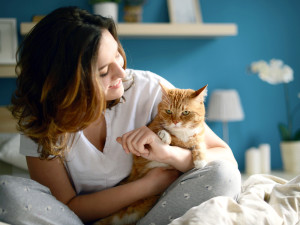Do You Have a Quiet Kitty? Why Some Cats Don’t Meow
You love that your cat is quiet, but sometimes too quiet can be concerning.

Share Article
In This Article:
Is It Normal for a Cat to Never Meow?opens in a new tab Why Some Cats Don’t Meowopens in a new tab What to Do if Your Cat Suddenly Stops Meowing?opens in a new tab Reasons Your Cat Stopped Meowingopens in a new tab When to Go to the Vetopens in a new tab
While some cats might be more vocal, others may be more reserved and — dare we say — quiet. All cats are different, so you can chalk this up to the cat’s personality, breed, or other ways in which they choose to express themselves. “Some cats are not vocal,” Jennifer Van de Kieftopens in a new tab, a feline behavioralist and feeding coach, says. “It’s in the range of normal behavior.”
However, if a formerly vocal cat suddenly becomes quiet, this may signal an underlying issue. Here are the signs to look out for.

littleKin™ is Kinship’s home just for puppy and kitten parents. Bop over to check out expert advice, new pet tools, and special deals—all curated for your newest family member.
opens in a new tabMain takeaways
Some cats are naturally quiet, so it’s normal for them to not be super vocal.
Some breeds are also more quiet than others.
If your cat was previously vocal but has stopped meowing, this might indicate something more serious — such as stress, anxiety, or a medical issue — and time to contact your veterinarian.
Is it normal for a cat to never meow?
If your cat has always been quiet and rarely meowed, this isn’t necessarily a cause for concern. Some cat parents have never heard their cat meow, and that might just be the cat’s personality or the fact that they vocalize in different ways (such as purringopens in a new tab or chirping).
How much do cats normally meow?
“It depends on the cat. Some cats are more vocalopens in a new tab than others,” Van de Kieft says. “Some cats vocalize frequently. They learn that they get a response from their guardian. They may ask for food or attention by vocalizing.”
Some cats just don’t meow, here’s why
Cats aren’t very vocal with one another — only mother cats are, with their kittens. So as they get older, they don’t meow as much. Scientists say that cats meow to their humans as a way to communicate and get what they want. Some cats just might not be very vocal due to their personalities or breeds.
What should you do if your cat has suddenly stopped meowing?
If your cat has always been on the quiet side, there might not be cause for concern. However, if your cat has been more vocalopens in a new tab, you may want to pay attention to other possibilities like lethargy or underlying medical issues. If it’s cause for concern, you should contact your veterinarian.
Reasons why your cat has stopped meowing
Cats might stop meowing for many different reasons. Van de Kieft gives some examples. “If they were not getting a response that they wanted, they might try something else instead. For example, if your cat is hungry and meows and no food is provided, they might try something else like scratching your couch to get your attentionopens in a new tab.”
Stress or anxiety
Stress or anxiety may be a reason your cat has stopped meowing. Look around your home environment for new things that may be causing stress, such as a new cat, a baby, or a move to a new home. Stress may cause a cat to be less interested in communicating with their pet parents.
Change in environment or routine
Any sort of difference in environment or routine may cause a cat to stop meowing. Pay attention to your cat’s surroundings and changes in their routine to see if there’s potentially a connection between those changes and the lack of communication.
Upper respiratory infection
Upper respiratory infections (commonly known as cat flu) may cause inflammation in the upper respiratory tract, which changes a cat’s meow such that it becomes raspy or disappears altogether. These symptoms may also come with sneezing, a runny nose, and lethargy.
Laryngeal problems
The larynx, also known as the cat’s voice box, is the opening to the trachea (or windpipe). Any issues with it may affect your cat’s meow. A cat can get inflammation in their larynx which may result in laryngitis, much as it does with humans. There can also be more serious issues with the larynx, such as paralysis or cancer, which can cause permanent damage and should be treated with immediate medical attention.
Cancer
Cancer may cause changes in a cat’s meow, but this is a less likely cause. Here, tumors in the upper respiratory tract change a cat’s meow and vocalization.
Hyperthyroidism
Hyperthyroidism, which usually occurs in older cats, can make a cat’s “voice” hoarse and cause other symptoms like weight loss. There’s also the possibility that an overactive thyroid can cause a cat to become chattier, so it may help to get your cat’s thyroid tested.
Lethargy
Cats who are lethargic and feeling unwell might be quieter and not meowing as much. This may be a sign to take your cat to the vet to get them checked out, just to make sure this is not a bigger medical issue.
When to go to the vet for a sudden stop in meowing
Cats who have never meowed, or been historically quiet, are probably not having medical issues. However, Van de Kieft says, “If your cat vocalizes frequently, particularly if it’s a new behavioropens in a new tab, you should see your veterinarian, as it might be a sign of an underlying medical issue. Your cat may be uncomfortable or frequently hungry, and it should be addressed by a professional.”
Bottom line
Some cats may just not be as vocal as other cats because of their personality or breed.
However, a cat who is usually vocal and suddenly becomes quiet may be exhibiting a sign of stress or anxiety (due to environmental changes) or an underlying medical issue.
FAQs
Why is my cat so quiet all of a sudden?
If your cat is normally vocal and suddenly becomes quiet, you should pay attention to its body language, changes in the environment, or any potential medical issues.
Do some cat breeds not meow?
Cat breeds such as the Maine Coon, Russian Blue, American Shorthair, Cornish Rex, and Munchkin are quieter.
Can cats lose their meows?
Yes, and that’s likely due to illness. They can lose their meows due to health issues such as hyperthyroidism, cancer, or an injury to the throat area. But most commonly, this is because of laryngitis, which is easily treated.
Should I be worried if my cat stops meowing?
That depends on your cat. If your cat has always been vocal and suddenly stops meowing, it may mean that there’s some sort of underlying issue affecting them, from an environmental change to a health issue. Take a look at both your cat’s behavioropens in a new tab and their surroundings to determine whether or not it’s time to call your veterinarian.

Kerensa Cadenas
Kerensa Cadenas is a writer based in New York. She’s previously worked at The Cut, Thrillist, Cosmopolitan, and Complex. Her work has been featured in Vulture, GQ, Vanity Fair, and others.

